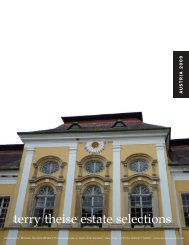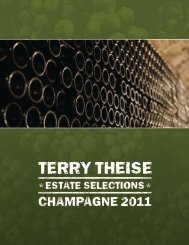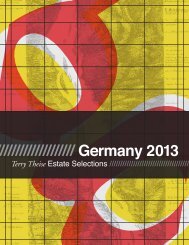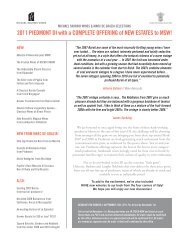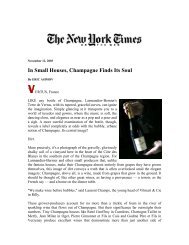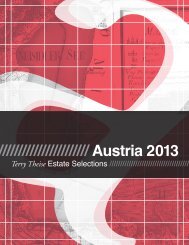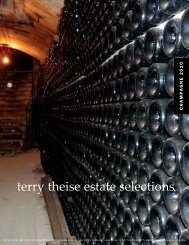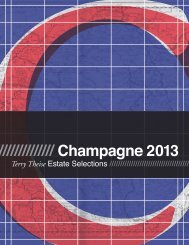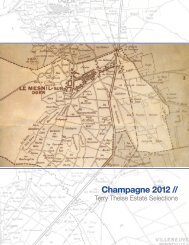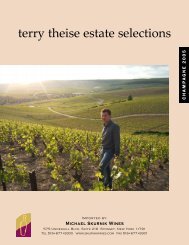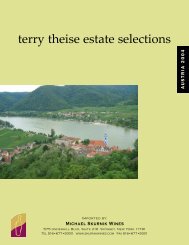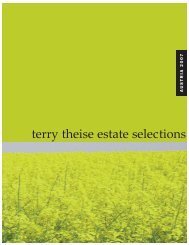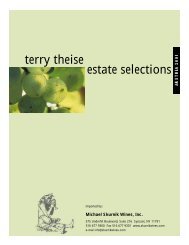German Catalog 2006 USE THIS ONE.qxp - Michael Skurnik Wines
German Catalog 2006 USE THIS ONE.qxp - Michael Skurnik Wines
German Catalog 2006 USE THIS ONE.qxp - Michael Skurnik Wines
Create successful ePaper yourself
Turn your PDF publications into a flip-book with our unique Google optimized e-Paper software.
heinhessen wines<br />
A few of you may recall my saying, some seventeen years ago, that the Pfalz was the region to<br />
watch; it was creative, hyper-oxygenated and full of vitality—and so it was. And the press took<br />
notice, and the Pfalz was and remains established as an attractive and important wine region.<br />
But there’s a settled-ness in the Pfalz now, and this was inevitable. Eventually the up-and-coming<br />
being finally ups-and-comes. And there’s a clear and present danger the Pfalz will be suffocated<br />
by the ideologies of its movers and shakers, if this hasn’t already happened. Am I overstating?<br />
Try and find a single Riesling Kabinett with residual sugar on any significant restaurant in the<br />
region! You needn’t bother: you can’t do it. The fetish for dry wine has cast a pall over the land.<br />
But all is not lost. In fact the spirit of inquiry still lives. The sense of community still lives. The<br />
heady feeling of youthful energy and idealism still lives. The sense of a region awakening still lives.<br />
Only one thing has changed—it has migrated a few miles northward, to the RHEINHESSEN.<br />
At this very moment Rheinhessen is <strong>German</strong>y’s most<br />
interesting wine region. And this is entirely due to its<br />
people, because its terroirs remain unremarkable. Indeed<br />
one laments the cruel irony; if only these young lions had<br />
grown up in the Rheingau. But we take passion where we<br />
can find it, and we’re finding it here.<br />
And it isn’t only happening along the Rheinfront by<br />
Nierstein. Last year at Gysler I noticed a poster for a tasting<br />
featuring growers in a group called Message In A<br />
Bottle. Any group to which Alex Gysler belonged was<br />
ipso facto intriguing, and I asked Alex whether any of his<br />
colleagues might be interesting to me. You’ll see the<br />
results of his answer a few pages hence. Perhaps these<br />
guys were inspired by the acclaim attaching to Wittmann<br />
and Keller, who are making stellar wines from vineyards<br />
no one heard of ten years ago.<br />
Sure the Rheinhessen remains home to a great deal<br />
of dross (Liebfraumilch has to come from somewhere, I<br />
guess) but there’s no equivalent buzz in the Rheingau,<br />
where mediocre wine from great land remains the status<br />
quo. Indeed the Rheinhessen seems to invert that<br />
melancholy formula, making excellent wine from<br />
(ostensibly) nondescript land. You don’t drive around<br />
thinking “Well it’s obvious that great wines come from<br />
here.” Instead its landscape is lullingly formless; without<br />
rhetoric, rolling and buckling its gentle pointless<br />
way. I like it in every kind of weather, sometimes hazy<br />
and secretive and other times clear and full of vista. An<br />
early Spring morning when the first smoky haze hasn’t<br />
quite burnt off—that’s how I remember it best, dreamy<br />
and indistinct, the plain little villages emerging<br />
vaporously from the mist.<br />
You need a really unassailable idealism to worry and<br />
strain out a living in the Rheinhessen. It’s romantic in a<br />
grand, quixotic way to work the steep slopes, but the flat-<br />
tish, rich-soiled Rheinhessen is another matter. It may be<br />
possible that great wines just could be written into some<br />
of this land, if you’re unwilling to assume they aren’t,<br />
and willing to stake it all on your idealism. And, I’d have<br />
Rheinhessen is still a buyer’s market,<br />
happy for us in the short term, if the<br />
growers can survive.<br />
to add, willing to sell your wine for something less than<br />
it’s worth. It helps that much of the vineyard work can be<br />
done by machine, but it helps even more that these young<br />
people no longer feel alone; they are part of an informal<br />
fraternity working for a common good.<br />
The results for us are entirely desirable: We can<br />
obtain beautiful wines for very gentle prices. I only<br />
added a single new estate to the portfolio this year, and<br />
it came from Rheinhessen.<br />
121



